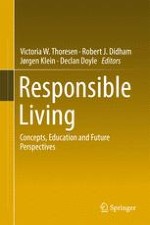2015 | OriginalPaper | Chapter
Social Learning for Sustainability
Advancing Community-Based Inquiry and Collaborative Learning for Sustainable Lifestyles
Authors : Robert J. Didham, Paul Ofei-Manu
Published in: Responsible Living
Publisher: Springer International Publishing
Activate our intelligent search to find suitable subject content or patents.
Select sections of text to find matching patents with Artificial Intelligence. powered by
Select sections of text to find additional relevant content using AI-assisted search. powered by
